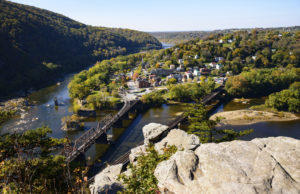
Known for its mountainous landscape and rolling hills, this month we travel east to West Virginia. The state has a rich history and is embedded in the Appalachian Mountains.
West Virginia is known for a wide range of outdoor recreational activities, such as skiing, whitewater rafting, fishing, hiking, backpacking, mountain biking and hunting. For something on the calmer side, the state offers many golf courses.
It is also one of the most densely Karstic areas in the world, making it a choice area for recreational caving and scientific research. Karstic topography is a landscape formed from the dissolution of soluble rocks such as limestone, dolomite, and gypsum. It is characterized by underground drainage systems with sinkholes and caves. These underground hydrology systems contribute to much of the state’s cool trout waters.
West Virginia also offers a number of historical and cultural attractions. Harpers Ferry National Historical Park is a historic town and was the site of John Brown’s 1859 slave revolt and raid on the US Armory and Arsenal. Harpers Ferry is also the midpoint of the Appalachian Trail, which runs from Maine to Georgia.
Business Climate
West Virginia is known for its mining industries. One of the major resources in West Virginia’s economy is coal. The state is one of the top coal producers in the country, second to Wyoming. West Virginia also produces large amounts of natural gas and oil. The state is located in the heart of the Marcellus Shale Natural Gas Bed, which stretches from Tennessee north to New York. Logging is also popular in the state due to the overpopulation of deciduous forests in the state. Oak, cherry, poplar, maple and pine are just a few of the various trees often harvested.
Farming is also practiced in West Virginia, but on a limited basis due to the mountainous terrain over much of the state.
One of the state’s largest industries is tourism. A few destinations that visitors flock to are the Smoke Hole Caverns, Forks of Cheat Winery and Distillery, and Valley Falls State Park. Seneca Rocks is one of the premier rock climbing destinations in the eastern U.S. Canaan Valley is a popular winter sports destination.
Tax Climate
West Virginia’s individual income tax system consists of five brackets with a top rate of 6.5%. The top rate ranks 18th highest among states that levy an individual income tax. The state and local tax collections per person were $969 in 2013, which ranked 27th highest nationally.
The state’s corporate income tax system consists of a flat rate of 6.5%. That rate ranks 24th highest among states that levy a corporate income tax. West Virginia’s state and local corporate income tax collections per person were $131 in 2013 which ranked 27th highest nationally.
West Virginia levies a 6% general sales or use tax on consumers, which is about the average of the national median of 5.95%. The average local sales tax rate is an additional 0.2%. West Virginia’s state and local governments collect $677 per person in general sales taxes and $785 per person in excise taxes, for a combined figure of $1,462, which ranks 26th highest nationally. The state’s gasoline tax stands at 33.2 cents per gallon, 11th highest nationally, while its cigarette tax stands at 55 cents, 45th highest nationally.
West Virginia’s state and local governments collected approximately $798 per person in property taxes in 2013, which ranks 45th nationally.
Tax Incentives and Credits
Tax credits provide incentives to support business growth and activities in West Virginia. These include:
Commercial Patent Incentives Credit- The Commercial Patent Incentives Credit can offset up to 100% of the corporation income tax, or in the case of individual taxpayers, the personal income tax. The credit is based on a percentage of royalties, license fees and other considerations for developers of a patent or a percentage of net profit pertaining to a patent used in a manufacturing process or product when that patent has been developed in conjunction with an agreement with local universities.
Corporate Headquarters Credit- Companies that relocate their corporate headquarters to West Virginia are eligible for tax credits if 15 new jobs (including relocated employees) are created within the first year. The credit can offset up to 100% of the tax liability for the business and occupation tax, corporate income tax, and personal income tax on certain pass- through income, for a period of up to 13 years.
For more information on these tax credits, the West Virginia Department of Commerce has more information to help you get started.
Our team at Miles Consulting Group is always available to discuss the specifics of your situation, whether in West Virginia or other U.S. States, and help you navigate the complex tax structures arising from multistate operations. Call us to help you achieve the best tax efficiencies.
Random Facts
- West Virginia is the 41st largest state by area, the 38th most populous state, and has the 2nd lowest household income of the fifty states.
- The average elevation of West Virginia is approximately 1,500 feet above sea level, which is the highest of any U.S. state east of the Mississippi River.
- The Greenbrier hotel and resort, originally built in 1778, has long been considered a premier hotel frequented by numerous world leaders and U.S. Presidents over the years.
- The Jones Diamond, at 34.48 carats, discovered in 1928 in the state, is one of the largest diamonds ever discovered in North America.
- The state motto is Montani Semper Liberi, which means “Mountaineers are always free”



















